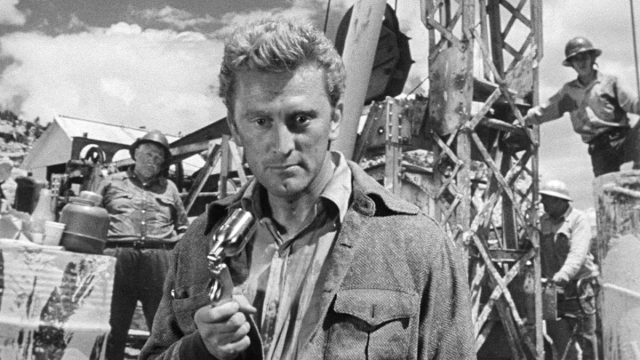Kirk Douglas’s Chuck Tatum tells us who he is as soon as he barges into an Albuquerque newspaper office looking for a job: “I can handle big news and little news. And if there’s no news, I’ll go out and bite a dog.”
At first, it’s easy to mistake it as just part of Tatum’s pitch. He has a good line of talk: witty, pithy, and relentlessly attuned to his audience. He seems like he’d be entertaining to work with–and indeed, his colleagues at the Albuquerque Sun-Bulletin treat him like he’s a TV playing in the background, an office ornament who provides a little extra color and dazzle. What he is, start to finish, is a showman. Another movie would make Ace in the Hole the story of Tatum’s redemption: big-talking, hard-drinking, womanizing reporter washes up in a small town, and the salt-of-the-earth honesty and lack of pretentiousness he learns there gives him the tools he needs to tackle the biggest story of his life. But by gum, once it’s over, he’ll stay in Albuquerque. He’s covered the truth and uncovered himself, and he’s discovered that he’s a heroic man who deserves to have most of his pride but should, you know, shut the fuck up about it once in a while.
Billy Wilder’s Ace in the Hole is not that movie, because there is no real Tatum to uncover. He is exactly who he says he is, and the only surprise is realizing that his energetic, charismatic showmanship isn’t just a blustery front, a facade over either courage or weakness: it runs straight to his spine, and it’s as unyielding as steel. He has ambition, and he has talent, and that’s all there is of him. And when he finds the right dog, he’ll not only bite it, he’ll hang on by the teeth and wring every drop of life out of it.
Needless to say, he finds his dog; there was never any chance he wouldn’t. It’s fascinating and horrifying to watch Tatum spin a three-ring circus out of the case of Leo Minosa (Richard Benedict), who is trapped in a cave-in. Leo becomes a whole industry, the unknowing center of a web of vote-gathering, contract-securing, paper-selling, reputation-building, and ever-rising prices. He’s the pie everyone wants a slice of. If Tatum hadn’t come to town, he would have been out of the mine inside a day, none the worse for wear. Instead, Tatum slowly kills him.
Almost everyone else in Tatum’s orbit becomes a worse person. He’s electric and irresistible–it’s one of Douglas’s all-time best performances, which is saying something–and larger-than-life, and he brings that sense of scale to the people he corrupts. Most of them aren’t good people to start with, but they have a built-in sense of limits and lack a certain kind of imagination. It wouldn’t occur to them that if you have a man stuck in a mine, you might not get him out. They might capitalize on a tragedy in other ways–the sulky, dissatisfied Lorraine Minosa (Jan Sterling) might take advantage of all this to finally leave her besotted schmuck of a husband, for example–but it would have all the lassitude and banality of someone at a self checkout ringing up their organic produce as standard. They’d have to feel like everyone else was doing it; you don’t want to be worse than your neighbors. Tatum, on the other hand, is grandly awful. Whatever satisfies his drives isn’t excess, it’s what he needs–and, because he’s actually as smart and skilled as he thinks he is, it’s what he’s capable of getting.
Tatum does eventually show a shred of conscience, but it–just like his faults–only incidentally leads to his downfall. If he survived, he would eventually do all of this all over again. He’d just tell himself that he’d get it right this time.
Ace in the Hole is streaming on Amazon Prime.

